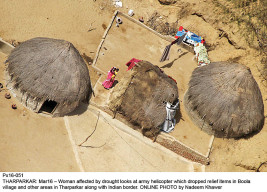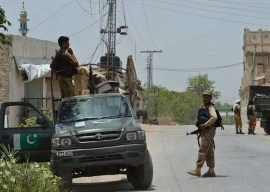
The federal government has decided to reduce the price of wheat in Gilgit-Baltistan (G-B) by retaining a subsidy on the commodity following recent protests which gripped the entire region.
The people of G-B began protesting the government’s decision to gradually withdraw the subsidy on wheat after a decision was taken by the Federal Cabinet’s Economic Coordination Committee (ECC) back in 2011 during the Pakistan Peoples Party (PPP) government.
However, the PPP did not withdraw the grant despite the ECC’s directives, keeping in mind the possibility of adverse reactions from the public. As a less developed area, G-B has been availing subsidised wheat since the 70s, under the directives of the party’s founder Zulfikar Ali Bhutto.

This year, the federal government implemented the ECC’s decision and started gradually increasing the price of wheat which reached Rs17 per kilogramme (kg) from Rs12 in a short span of time. The move resulted in a serious reaction from the public. Numerous protests and strikes erupted; the Awami Action Committee (AAC) – a group consisting of several religious, political and nationalist parties – swung into action to press the federal government to review the decision.
Waiting for the official word
Official sources said the Pakistan Muslim League-Nawaz (PML-N) government has decided to retain the fiscal assistance for the time being and to bring the price to its original subsidised amount. They revealed the ministry has also taken up the issue with the finance division which has agreed in principle to retain the subsidy.
The Federal Minister for Kashmir Affairs and Gilgit-Baltistan Chaudhry Barjis Tahir will fly to Gilgit this week to meet political, religious and nationalist parties, and formally announce the decision.
However, AAC Chairman Ehsan Ali suspects the move could be a ploy to restrict the committee from holding mass protests.
“I am not going to believe their claim as it could be a ploy. We will wait for an official notification,” Ali told The Express Tribune.
Ali, who was the driving force behind the movement, said their protests would last till society is cleansed of corruption and mismanagement. Aslam Khan, a trader in Gilgit, welcomed the step and said the people would be grateful to the government if the subsidy was restored. “The people of the region are poor and the restoration of wheat subsidy would be a gift for us,” he said.
All politics is local
It has been learnt that the local PML-N leadership has played a key role in making the federal government review its decision, keeping in view upcoming elections for the G-B Legislative Assembly. Any policy that can be perceived as ‘anti-poor’ will strongly dent the party’s vote bank in the area.
“The recent anti-government protests created a bad impression about PML-N as political and religious parties tactfully cashed in on the issue. Our party was cast as the evil anti-people entity,” said a senior local leader of the PML-N.
In an apparent move towards damage control, Tahir will visit the area on the request of the party’s local leadership and announce a review of the ECC’s decision over the wheat subsidy as well as several other projects for the region.
Last month, Tahir had announced the federal government will not further increase wheat prices from Rs17 per kg. However, after the start of protests in G-B, it was brought back to Rs14 but that too was rejected by AAC, which asked the government to bring the price down to the original rate of Rs8 per kg. Those familiar with the matter have said this is not possible but their aim is to bring the subsidised price to Rs12 per kg.
Published in The Express Tribune, March 17th, 2014.
COMMENTS (1)
Comments are moderated and generally will be posted if they are on-topic and not abusive.
For more information, please see our Comments FAQ




































Following repeated protests:- The Government to regularize ad hoc workers now known as NCP Cadre, Following protests the government to cancell and reappoint teachers following protests:- the government to withdraw inquiries following protests: the government to re-initiate inquiries following protests the government to pay compensations DBD following protests the government to enhance salaries following protests the government to release prisoners following repeated protests the illegal timber being released following protests the crown lands got eveacuated etc etc what is this?Cannot these issues be resolved amicably and within the four corners of law???? Unfortunate indeed. Asgher